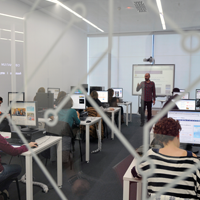Curs online - Masterclass: Intel·ligència Artificial i l'ètica dels algoritmes
Curs online - Masterclass: Intel·ligència Artificial i l'ètica dels algoritmes
Coneix com funcionen els algoritmes d'aprenentatge automàtic (Machine Learning). S'analitzaran les implicacions ètiques que es generen quan aquests algoritmes s'empren a l'hora de prendre decisions que impliquen persones, com selecció de personal, accés a universitats o accions judicials.
Specific goals | Temary
Making the concepts of artificial intelligence comprehensible to the general public as they are currently being used in many digital services. Understanding that "intelligence," "learning," "recognition," etc., when spoken in a computational context, are just metaphors to facilitate understanding and at no time should we assume that these machines are actually learning or that they are intelligent in a human sense. It will show how some of the applications of this software in our everyday lives present significant ethical challenges that need to be analyzed and weighed. Distinguishing between those ethical challenges that are really a result of the software's application itself and those that only become problematic depending on a particular use by unscrupulous humans.
SYLLABUS
- What is an algorithm? Introduction to the concept of an algorithm in general to understand its ubiquity in all computational space.
- Types of artificial intelligence. Differentiation between a symbolic form of artificial intelligence, where the programmers have full control over the algorithm versus machine learning, where the program extracts patterns from statistical analyses.
- Uses of machine learning in current digital services. Presentation of how common machine learning is in the vast majority of digital services we use today.
- What are neural networks? A non-technical presentation of what neural networks are, their origin, and how they are currently used.
- Different models of machine learning. Discussion, avoiding technicalities, of the different ways in which machine learning programs extract patterns.
- What is deep learning? Presentation of this particular type of machine learning, showing the basic differences with the other types explained previously.
- Possibilities and limits of machine learning. We would show in what ways machine learning differs from the way humans learn and reason.
- The algorithm as a black box. The problem that arises because the algorithms, being created automatically, do not know for sure what they do.
- Reliability of algorithms. Being based on a context to learn, algorithms can produce erroneous and unexpected results when the context changes.
- The filter bubble. How algorithms that regulate the flow of information on social networks tend to create bubbles where we believe everyone thinks like us and we end up accepting "fake news" and the like.
- Algorithmic injustice. How machine-learning-based algorithms, if used to make decisions with social implications, such as in justice, politics, education, medicine, can end up replicating existing injustices and even amplifying them.
Editions
From Mon 01/04/24 al Tue 30/04/24
From Sat 01/06/24 al Sun 30/06/24
General information
Enrolment
>> This online activity is available between the first and last day of each month.
>> Registration is possible even if it has already been started.
>> To enroll in any online activity you need to have a web user created. You can create it here.
>> Once enrolled you will find the course in your Personal Space --> Activities --> Activities in progress (barcelonactiva.cat)
>> You can access the materials of the activity while editing is active.
>> This online course is self-training.
>> To view the videos subtitled, click on the CC button you will find in the video playbar and select language.
Certificate
>> You will get a certificate of accomplishment when completing all modules and overcoming the activities/test, of the formation before the end of the editing in which the enrolment was made.
>> Course completion status. Within the same course you will find the Results menu point, you will find the Export option (top right). Clicking will open a document showing a report with the status of each lesson. If there are any lessons that are not approved, the contents need to be re-examined as there is some part left undisplayed/made.
>> Once the training is completed, within 24 to 48 hours you will be able to download the certificate to your Personal Space --> Activities --> Activities performed (barcelonactiva.cat)
Recommendations
>> It is recommended to perform training from a computer and not from mobile or tablets.
>> The most used browsers are: Google Chrome, Safari (for iOS operating systems), Microsoft Edge (for Windows operating systems) and Mozilla Firefox.
Course ratings
Lesson taught by

CASACUBERTA SEVILLA








